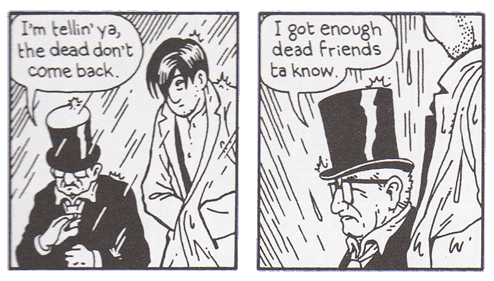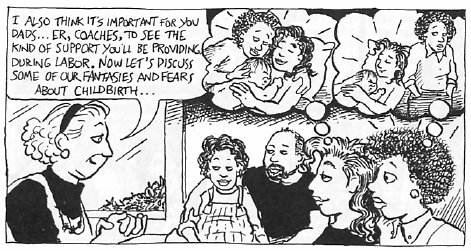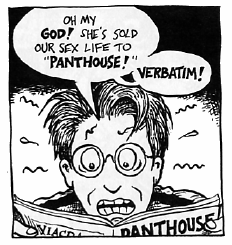

| March 1996 |
|
What would a zine be without reviews? Better, probably. Why not go out and read the comics or listen to the music or whatever, rather than read some crank's opinions about them on the Web?
Who is Bob? Well, I tried to get the enigmatic George Hamilton Cecil III to write reviews for Metaverse, but he was busy deconstructing libertarianism, so I asked Bob. He couldn't do it either, but I liked his name. Bob. Bob's Red-Hots. Bob's Reviews. Bob's Bank. It just sounds reassuring, doesn't it?
| Jason Lutes: Jar of Fools | |
 They seem to have lots of stuff like this in Europe, but it's rare here-- just a story, no superheroes in sight, no bodily fluids, no bondage, no résumé of the artist's miserable life.
They seem to have lots of stuff like this in Europe, but it's rare here-- just a story, no superheroes in sight, no bodily fluids, no bondage, no résumé of the artist's miserable life.
An unemployed stage magician, Ernie, tries to get over a failed love affair and his brother's suicide, and gets involved with a con man and his daughter, as well as his mentor in magic, Al Flosso, who at 79, and starting to get senile, still has it together more than Ernie.
The characters are well-drawn, in both senses. Ernie is perhaps just your standard depressive, but the con man and Al are both fascinating. (Their conversation on whose job involves more trickery is great.) Even the minor characters (such as a lesbian couple, one of which takes pity on Ernie, while the other despises him) seem to have interesting untold stories.
Ruminations on changing entertainment values and the art of the con, on love and broken hearts, on hopes for change. Some nice tricks and cons. And for comics pedants, there's an unexpected Tintin reference, and violations of the 180-degree rule (the camera angle often changes direction between panels).
| Alison Bechdel: Dykes to Watch Out For | |
 If you don't know this strip, drop that mouse, put down that Twinkie, and run (don't walk) to the nearest Borders to score yourself a copy.
Dykes is one of the five best comic strips currently being published. (What are the other four?) It's hip, intelligent, well drawn, politically aware, sweet, honest, very human, and funny.
If you don't know this strip, drop that mouse, put down that Twinkie, and run (don't walk) to the nearest Borders to score yourself a copy.
Dykes is one of the five best comic strips currently being published. (What are the other four?) It's hip, intelligent, well drawn, politically aware, sweet, honest, very human, and funny.
If you're a hetboy, don't sweat it. Don't be like the clueless guy on rec.arts.comics who complained that Dykes didn't have enough men in it. Do what women have to do with 90% of all comics: identify with the opposite-sex characters. It's not hard to do-- lesbians like girls, too. You could read Calvin & Hobbes without being a tiger, couldn't you?
The strip centers around Mo, a relentlessly whiny bookstore clerk, and her circle of friends: Lois the cheerfully promiscuous Lesbian Avenger, Sparrow the self-help addict, Toni and Clarice, the lesbian moms, Ginger the perpetual grad student, and more, enough to address everything in the queer scene from nonmonogamy to bisexuality, from Michigan to Audre Lorde, from lesbian communes to marches on Washington.
A lot of the fun is in the details: the packages (breakfast cereals with a free crystal inside; Instant Hummus); the books in the bookstore (Heather Has One Sperm Donor; Madonna-trauma: Essays on Basically Nothing); baby Rafael's favorite bedtime toy, a stuffed tarantula.
 Another thing: she's good with hands. Hands are hell to draw. They require detailed work at small scale, and if they're not done right they look like claws or little hot dogs. But Bechdel draws knuckles, for God's sake. Even Jaime Hernandez doesn't draw hands that well.
Another thing: she's good with hands. Hands are hell to draw. They require detailed work at small scale, and if they're not done right they look like claws or little hot dogs. But Bechdel draws knuckles, for God's sake. Even Jaime Hernandez doesn't draw hands that well.
Good as Bechdel is as a strip writer, she's even better with longer forms. Most of the books have longer stories; the latest, Unnatural Dykes to Watch Out For, details the earlier lives of the main characters; with its elliptic storytelling and conflicting narratives, it's the most sophisticated story Bechdel has told yet. Her coming-out story, in Gay Comics #19, is also worth seeking out.
Update (2002): Hmm, looks like I didn't mention Bechdel's politics, which are unreconstructedly leftist, and all over the book. It's sometimes a bit much-- but on the other hand, I still read Dykes, and I have a really low tolerance for politics in cartoons, even if I agree with it. (I stayed with Tom Tomorrow for about three books, and got tired of it.) Bechdel's got a few tricks up her sleeve; one is that her main character, Mo, is such an overpoliticized neurotic that her own friends can barely stand her; another is that the characters are constantly arguing, even about politics; that Bechdel can make them each sound passionate and convincing is a tribute to her own compassion and levelheadedness. One recent strip, in which Mo changes her mind each panel about bombing Bosnia, is as thoughtful as anything you'll read in the opinion rags, and a lot funnier.After the time of the above review, Bechdel seemed to go through a period when she felt she had to put every character through hell. It was a little trying for the readers as well. Lately she's been following the evolution of the queer community into all sorts of radical directions... e.g., Sparrow is now dating a man. (Stuart, who's a lot nicer than Mo's current lover, Sydney the evil women's studies professor.)

* Dilbert, For Better or For Worse, Doonesbury, and Ernie. A more interesting quesion is, what are the five worst? Here we face rather an embarras du choix, but how about Fred Basset, Derf's The City, The Lockhorns, Terry and the Pirates, and Marmaduke?